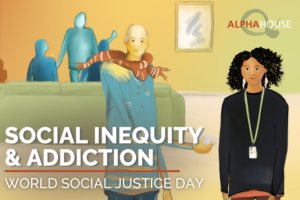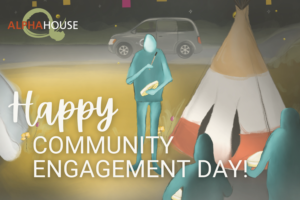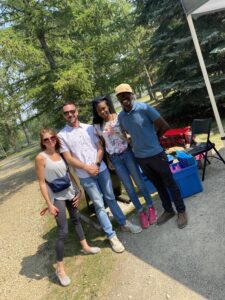
John’s story is one of resilience, determination, and how a second chance can transform a life. John currently resides at Providence House, our sober-living place-based housing building. John’s journey to recovery wasn’t a straight line but, with genuine support, motivation, and perseverance, he is now housed, sober, and looking forward to spending time doing the things he loves. We wanted to hear more from John about his story and his insights on what it takes to break through and achieve sobriety, and how Providence House was able to support his journey.
Q: What motivated you to start your sobriety journey?
A: I was tired of living in survival mode, constantly looking over my shoulder and not knowing where I was going to sleep or what I was going to eat next. Getting into Providence House gave me the opportunity to get off the streets, but I knew I couldn’t just be there physically—I had to be mentally and emotionally present too. To keep my housing, I had to commit to making some big changes.
Health was another major motivator. About five years ago, I had all of my toes amputated due to complications from rough sleeping in the winter. The frostbite from those nights on the streets took its toll on my body, and losing those toes was a huge wake-up call. I realized that I couldn’t keep living the way I had been. The physical pain and the reminder of what I had lost were enough to make me see that if I didn’t make a serious change, I was going to keep losing more—maybe my health, maybe even my life.
I didn’t want to go through that again. I wanted more for myself. I knew I deserved more than the life I had been living, and I was ready to take a step toward something better. Sobriety became the first step to that life—because I couldn’t expect my life to improve if I kept using. I knew that I had to make sobriety a priority if I wanted to rebuild my life and take care of my health, my relationships, and most importantly, myself.
Q: What support systems or resources were most helpful to you / How did the Providence program or team support you in your journey?
A: Alpha House Shelter, Detox, and Outreach Services were crucial in the beginning, especially with getting my NSQ (Needs and Services Questionnaire) done and helping me get into Detox. The staff at the Drop-in Center were also incredibly helpful in those early stages. They provided guidance and support when I was at a low point, making sure I had the resources I needed to get into detox and start working on my recovery.
Providence House played a huge role in both my recovery and my relapses. When I moved in, I was still struggling, and my first month was rough. I relapsed three times, but the staff didn’t give up on me. They were patient, understanding, and supportive. They kept me on track by doing weekly toxicology testing, which helped me stay accountable. Even when I slipped, they didn’t push me away—instead, they kept encouraging me to stay engaged in the programming they offered, which gave me the structure I needed.
At treatment, I finally got the help I needed to face some of the deeper issues I had been avoiding. It was a tough process, but it was necessary. The support I received from Providence House during my relapses was critical—they didn’t just watch me fail; they were there to pick me up and guide me toward the help I needed. Without their support and the resources they connected me to, I don’t think I would have made it this far in my journey.
Q: How has your life changed since you became sober?
A: One of the biggest improvements has been in my health. I’m actually making progress in taking care of my health problems now, and I’m eating healthier than I ever have. That’s something I never really focused on before, but sobriety has given me the clarity and energy to start making better choices for myself.
Another major change is that I’m financially stable now. Along with the help of the staff at Providence, I’ve been able to receive income support through AISH, which has been a huge relief. I don’t have to worry about where my next meal is coming from or how I’m going to pay rent. Stability has allowed me to focus on my recovery without the constant stress of survival. I see the chaos that others around me are still going through, and I’m grateful that I’m no longer living that way. I no longer feel trapped in that survival mode, and it’s a huge weight lifted off my shoulders.
Sobriety has allowed me to stop just surviving and start thriving. It’s a completely different mindset than I had before. I feel like I’m building a life, not just trying to get through each day. I’ve got hope and excitement for the future, and that’s something I didn’t have before.
Q: What activities or habits have you found beneficial in maintaining your sobriety?
A: One of the most important has been attending 12-Step meetings. They’ve given me a space to share my experiences, hear others’ stories, and stay connected to the recovery community. The meetings help me keep my focus on my sobriety and give me tools to handle life’s challenges without turning back to old habits.
Another key part of my sobriety is the relationship I’ve built with my sponsor. We meet regularly for coffee, and having that one-on-one connection has been a game changer. My sponsor provides guidance, advice, and support when I’m struggling. It’s comforting to know I have someone who’s been through the process and understands what I’m going through. That support has been invaluable in my recovery.
Additionally, the connections I’ve made with other participants at Providence House have been essential. We share similar experiences, and it’s been so helpful to lean on each other when times get tough. Having that sense of community has made a huge difference in staying motivated and focused on my sobriety. Whether it’s talking through struggles or celebrating milestones, the relationships I’ve built here are something I truly value.
Q: How do you celebrate your milestones and successes along the way?
A: To be honest, I don’t really like to make a big deal out of milestones. I prefer to focus on taking it one day at a time. That said, I do celebrate my progress in a quiet way. For example, when I reach certain milestones in my sobriety, I take chips at AA, which is a meaningful way for me to acknowledge the work I’ve put in and the progress I’ve made. But beyond that, I don’t need a huge celebration. I’m more focused on the daily grind, making sure I stay sober and continue working on myself. Each day sober is a victory in itself, and that’s something I try to remember and appreciate. For me, it’s about the long-term journey, not just the big moments along the way.
Q: What advice would you give to someone who is just starting their recovery journey?
A: My advice would be to keep coming back, even on the days when you feel discouraged or like you’re not making progress. Recovery isn’t always linear, and there will be tough days, but the important thing is to show up. Keep going to your meetings, keep reaching out for support, and don’t give up on yourself.
Also, try not to fight the people who are trying to help you. It’s easy to get defensive or think you know better, but the people around you—whether it’s staff, a sponsor, or other residents—are there to help guide you. They’ve been through it themselves and want to see you succeed. Trust in the process, even when it feels hard or uncomfortable. The people who care about your recovery are there because they want you to have a better life. Take their advice and give yourself the chance to heal.
Another important thing is to find purpose or a hobby that keeps you engaged. It can be something small to start with, but having something to focus on outside of recovery can make a big difference. Whether it’s learning a new skill, exploring a creative outlet, or just finding something you enjoy, it helps you build a life beyond addiction and gives you something to look forward to. Finding that sense of purpose can be a huge motivator in your journey to stay sober.
Q: Have you discovered any new interests or passions during your recovery?
A: One of the newest interests I’ve discovered during my recovery is online gaming. It’s something I never really got into before, but now I find it both enjoyable and relaxing. I love the challenge of the games, but what I really enjoy is meeting people from all over the world. It’s amazing how gaming can connect people from different backgrounds and cultures, and I’ve made some great friendships through it. It gives me a sense of community outside of recovery, and it’s a fun way to unwind. It’s also a way for me to stay engaged and distracted, especially on tough days. Having this new hobby has really helped me find balance and keeps me motivated to keep moving forward in my sobriety.
Q: How do you stay positive and motivated on difficult days?
A: In the beginning, it was really tough. There were days when I didn’t think I could keep going, but I relied heavily on my peers and my sponsor for support. Having people around who understood what I was going through made a huge difference. We would talk, share our struggles, and encourage each other to keep going.
The environment I was in during early recovery also played a big role in helping me stay motivated. I found that being in a more restrictive environment, like detox and treatment, was especially beneficial for me. It forced me to focus on myself and my recovery, without the distractions of the outside world. It wasn’t easy, but having that structure and accountability helped me stay on track.
On tough days now, I remind myself that recovery isn’t always going to be smooth, and that setbacks are part of the journey. I lean on the tools I’ve learned and the people I trust to get through those harder moments. Staying connected to my support system and having a routine helps me stay grounded and motivated, even when things feel difficult.







